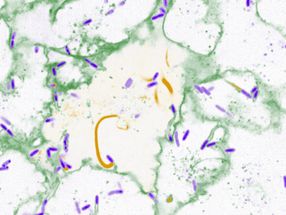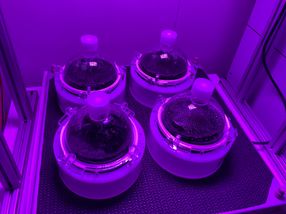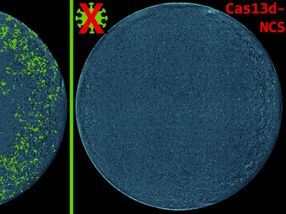Myrad Genetics discovers novel anti-cancer drug
Compounds Selectively Activate Programmed Cell Death
Salt Lake City, October 9, 2001
Myriad Genetics, Inc. has discovered a novel drug target for the treatment of a broad range of cancers, and has initiated lead optimization with a series of compounds that selectively kill cancer cells, the Company announced today. The anti-cancer target was discovered using Myriad's ProNet® proteomics technology to investigate the protein interactions that lead to normal programmed cell death (apoptosis). Pre-clinical studies have demonstrated strong anti-cancer activity without harming normal human cell survival.
Myriad researchers found that MPI-176716 induces apoptosis in several cancers, including prostate cancer cells and T cell lymphomas. In a series of experiments designed to test the selective ability of the compound to drive cancer cells into apoptosis, Myriad researchers used cell lines that are not responsive to current chemotherapy drugs. After the addition of MPI-176716, the percentage of cells killed increased in a dose-dependent manner, reaching 98% of prostate cancer cells and 99% of T cell lymphoma cells that were forced into apoptosis. In addition, Myriad scientists were able to block the activation of apoptosis by inhibiting a key enzymatic step in the pathway. In this case, the cancer cells survived following the addition of MPI-176716, demonstrating that the drug is not generally toxic to cells, but uses the cell's own biological mechanism to kill them.
These encouraging results have led to a series of experiments that are underway at Myriad to use medicinal and organic chemistry techniques to maximize the desired characteristics of the compound, while maintaining their selective ability to eliminate cancer cells and leave normal cells unharmed.
"The compounds we are developing against this target show broad anti-cancer activity," said Dr. Adrian Hobden, President of Myriad Pharmaceuticals, Inc. " They further our cancer emphasis by joining our prostate cancer drug, MPC-7869, which is in human clinical trials, and our colon cancer drug, MPI-42511, which is in advanced pre-clinical testing."
The target of MPI-176716 is a protein that, Myriad believes, has not been explored previously for drug development, and represents a totally new approach to killing cancer cells. Cancer is essentially uncontrolled cell growth. Normal cells are destroyed after they have served their function or have become senescent. If this process, called apoptosis, is not functioning properly or damaged, cells may continue to divide and grow, resulting in cancer. Alternatively, if cancerous cells could be forced into the apoptotic pathway, they would be destroyed and control restored. Myriad has discovered a novel approach to inducing this cellular destruction.
Current cancer therapies are designed to kill cancer cells, however they are not selective in their action. Traditional chemotherapy and radiation therapy kill all rapidly dividing cells, including those that are normal and healthy. Broadly active anti-cancer therapies without such toxic effects on healthy cells are needed. By selectively inducing cell death in cancer cells, Myriad hopes to eliminate the toxicity associated with the current generation of therapies.
Most read news
Topics
Organizations
Other news from the department science

Get the life science industry in your inbox
From now on, don't miss a thing: Our newsletter for biotechnology, pharma and life sciences brings you up to date every Tuesday and Thursday. The latest industry news, product highlights and innovations - compact and easy to understand in your inbox. Researched by us so you don't have to.

























































